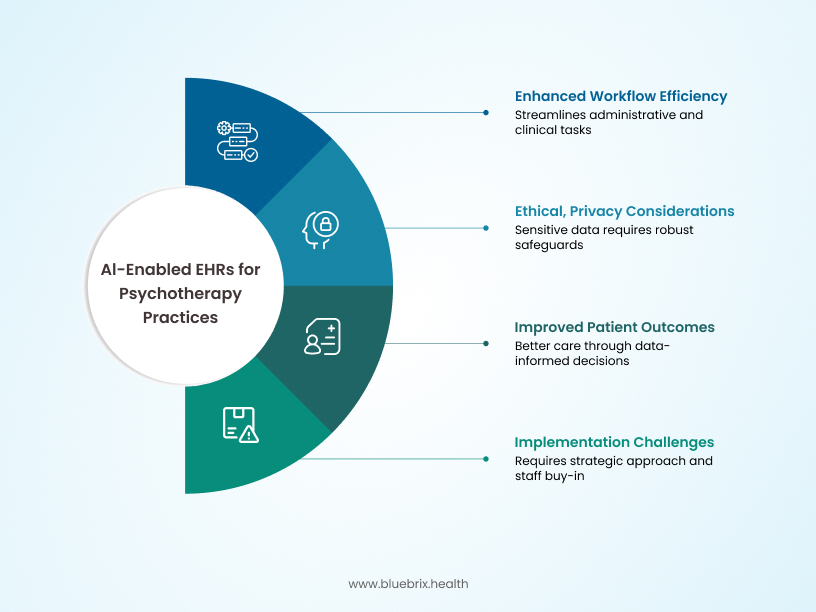As demand for mental health services soars and clinician burnout rises, behavioral health leaders are turning to artificial intelligence to support psychotherapists and improve care delivery. In fact, AI for psychotherapists is emerging as a game-changer – not by replacing the human touch, but by augmenting therapists’ capabilities and streamlining their workflows.

The Therapy Workflow Challenge
Psychotherapists today spend a significant portion of their time on non-clinical tasks – writing progress notes, formulating treatment plans, managing scheduling, dealing with insurance claims, and other admin work. This administrative burden not only eats into time that could be spent with clients but also contributes to clinician stress and burnout. Surveys indicate that over 70% of behavioral health providers feel paperwork and admin duties interfere with their ability to deliver quality care.
Key challenges in the therapy workflow include:
- Excessive Documentation: Each session generates notes, treatment updates, and billing codes. One study found providers spend up to 25–40% of their time on documentation.
- Inefficient Administrative Processes: Scheduling appointments, sending reminders, and handling no-shows are continual headaches. Missed appointments hurt patient care and the bottom line, yet chasing every no-show is very time-consuming.
How AI-Enabled EHRs Streamline Psychotherapy
Integrating AI into daily practice through an AI-powered EHR offers tangible relief for these workflow pain points. Unlike add-on apps or generic tools, an EHR with native AI capabilities embeds intelligence directly into clinicians’ everyday workflows. This means routine tasks get done faster (or automatically), and data turns into actionable insights – all within the system therapists already use for care.

Here are some of the major benefits an AI-enabled EHR delivers for psychotherapy practices:
- Automated Notetaking & Documentation: Instead of spending time typing notes after each session, therapists can leverage AI-driven transcriptions and smart summaries to generate first-draft progress notes in seconds, complete with key details. This can cut documentation time dramatically – early implementations show up to a 45% reduction in time spent on paperwork, freeing clinicians to focus more on clients.
- Intelligent Scheduling & Reminders: Robotic Process Automation (RPA) built into an EHR can handle repetitive tasks like scheduling follow-ups and sending appointment reminders via text or email. These AI-triggered reminders reduce no-shows (which has been shown to drop by up to 30% with automated outreach). Fewer no-shows mean more consistent care and stabilized revenue for the practice.
- Personalized Treatment Insights: Advanced AI can sift through patient data (notes, assessments, history) to spot patterns and make care suggestions. For instance, the EHR might alert a clinician that a client’s anxiety scores have been trending upward – prompting proactive treatment adjustments. AI can also recommend evidence-based interventions or flag relevant resources for a client’s condition.
- Outcome Tracking & Patient Engagement: AI can automatically administer patient surveys between sessions and flag important changes, giving therapists real-time feedback. AI chatbots can also check in with patients to reinforce exercises and alert clinicians to concerning trends. This keeps care continuous and responsive between visits, not just during the session.
In short, an AI-enabled EHR acts as a force multiplier for your clinical team. It offloads low-level tasks, ensures nothing falls through the cracks, and surfaces critical information when needed. The blueBriX platform, for example, is purpose-built with these AI features baked in – a unified system where AI agents work behind the scenes to support clinicians without adding complexity.
Proving the ROI and Value of AI in Practice
For decision-makers evaluating new technology, the bottom-line question is: does it truly make a difference? The case for AI in psychotherapy is backed by compelling metrics and early results:
- More Time for Therapy: By automating documentation and other drudgery, each therapist can reclaim several hours per week for patient care. Across a group practice, those saved hours are like adding staff without hiring.
- Reduced No-Shows, Better Retention: Automated engagement via AI can significantly reduce missed appointments and help patients stick with treatment, which improves outcomes while steadying revenue. Even cutting no-shows from 20% to 10% can save a mid-sized clinic tens of thousands of dollars annually.
- Improved Documentation Quality and Compliance: AI assistance not only speeds up note-writing but can enhance consistency and thoroughness. Notes drafted with AI are less likely to omit key elements (e.g. prompting for missing risk assessments), leading to better compliance with documentation standards and payer requirements, and reducing denied claims or audit risks.
Ultimately, an AI-integrated EHR shifts your system from a passive record-keeper to an active partner in care. Clinics already using AI report higher provider satisfaction (less burnout) and better patient experiences. In the long run, these translate into stronger outcomes and financial performance – a win-win for both mission and margin.
Navigating Ethics and Privacy Considerations
While the upside of AI in psychotherapy is significant, behavioral health leaders must also address ethical and privacy questions when implementing these technologies. Given the sensitive nature of mental health data and the importance of trust in therapy, using AI responsibly is paramount:
- Data Security & HIPAA Compliance: Ensure any AI features in your EHR are HIPAA-compliant with robust security and privacy safeguards to protect patient information.
- Maintaining Clinical Judgment: AI for psychotherapists is meant to augment, not replace, professional judgment. Therapists should always review AI-generated notes or suggestions. If an algorithm flags a risk or makes a recommendation, it’s ultimately the clinician’s responsibility to evaluate it in context. Keeping the human in the loop ensures care remains personalized and appropriate.
- Bias and Proper Use: Be mindful of potential biases in AI systems – for example, an algorithm trained on one demographic may be less accurate for others. Choose vendors that test their algorithms for fairness. Set internal policies that AI assists clinicians rather than making independent decisions, so you stay within professional guidelines.
Implementation Tips for Adopting AI in Your Practice
Bringing AI to a therapy practice or behavioral health organization doesn’t happen overnight. A strategic approach to implementation will help ensure success and staff buy-in. Here are key steps for decision-makers:
- Identify High-Impact Areas: Start by pinpointing where AI could help most. Is your team drowning in documentation? Are no-shows a major problem? Do you need better outcome tracking? Focus on one or two high value use cases to start.
- Choose the Right Platform: Rather than stitching together disparate tools, look for an integrated solution. Evaluate behavioral health EHRs that come with AI capabilities out-of-the-box. A platform like blueBriX, built with AI from the ground up, offers note assistance, automation, and analytics all unified in one workflow, simplifying deployment.
- Engage Your Team Early: Involve your clinicians and staff early in the selection process. Emphasize benefits that matter to them (e.g. saving an hour of paperwork a day, getting helpful prompts to avoid starting notes from scratch). Early buy-in will alleviate fears – reassure everyone that the AI is a tool to lighten their load, not replace them.
- Provide Training and Support: Even intuitive AI tools require some orientation. Offer training and ensure support is available for questions as your team gets comfortable with the new system.
- Start Small, Then Scale: Begin with a pilot program or a small group to gather feedback and fine-tune the system before a wider rollout.
- Monitor Outcomes and Iterate: Track key metrics (documentation time, no-show rates, clinician feedback) to ensure the AI tools are delivering results. Use this data to celebrate wins with your team and to refine your approach for maximum ROI.
Embracing the Future of Behavioral Health Care
The future of behavioral health is being shaped by intelligent technology working hand-in-hand with compassionate clinicians. Forward-thinking organizations no longer ask if they should adopt AI, but how. With AI tools now mature and proven, now is the time to take psychotherapy workflows to the next level. Embracing an AI-enabled EHR like blueBriX lets clinics streamline operations, improve care quality, and reduce burnout – all without losing the human touch in therapy. Those who innovate today will be well-positioned to thrive in the years ahead.